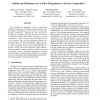Free Online Productivity Tools
i2Speak
i2Symbol
i2OCR
iTex2Img
iWeb2Print
iWeb2Shot
i2Type
iPdf2Split
iPdf2Merge
i2Bopomofo
i2Arabic
i2Style
i2Image
i2PDF
iLatex2Rtf
Sci2ools
104
click to vote
IEEESCC
2005
IEEE
2005
IEEE
Online and Minimum-Cost Ad Hoc Delegation in e-Service Composition
The paradigm of automated e-service composition through the integration of existing services promises a fast and efficient development of new services in cooperative business environments. Although the “why” part of this paradigm is well understood, many key pieces are missing to utilize the available opportunities. Recently “e-service communities” where service providers with similar interests can register their services are proposed towards realizing this goal. In these communities, requests for services posed by users can be processed by delegating them to already registered services, and orchestrating their executions. We use the service framework of the “Roman” model and further extend it to integrate activity processing costs into the “ad hoc” delegation computation. We investigate the problem of efficient processing of service requests in service communities and develop polynomial time ad hoc delegation techniques guaranteeing optimality.
| Added | 25 Jun 2010 |
| Updated | 25 Jun 2010 |
| Type | Conference |
| Year | 2005 |
| Where | IEEESCC |
| Authors | Cagdas Evren Gerede, Oscar H. Ibarra, Bala Ravikumar, Jianwen Su |
Comments (0)

